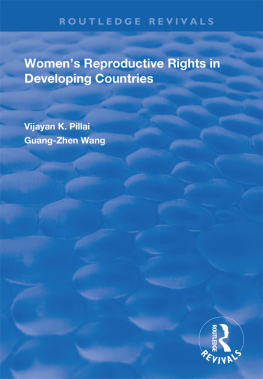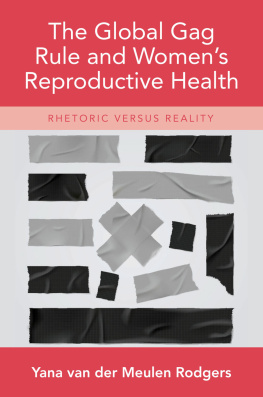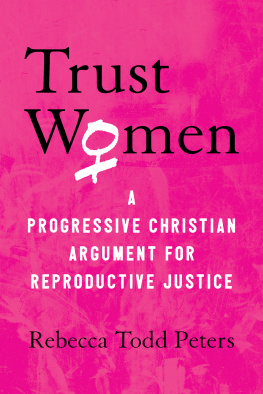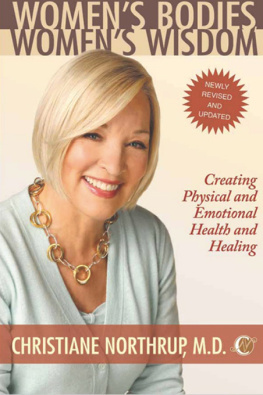Thank you for buying this ebook, published by NYU Press.
Sign up for our e-newsletters to receive information about forthcoming books, special discounts, and more!
Sign Up!
About NYU Press
A publisher of original scholarship since its founding in 1916, New York University Press Produces more than 100 new books each year, with a backlist of 3,000 titles in print. Working across the humanities and social sciences, NYU Press has award-winning lists in sociology, law, cultural and American studies, religion, American history, anthropology, politics, criminology, media and communication, literary studies, and psychology.
The Wandering Uterus
The Wandering Uterus
Politics and the Reproductive Rights of Women
Cheryl L. Meyer
NEW YORK UNIVERSITY PRESS
New York and London
Copyright 1997 by New York University
All rights reserved
Library of Congress Cataloging-in-Publication Data
Meyer, Cheryl L., 1959
The wandering uterus : politics and the reproductive rights of women / Cheryl L. Meyer.
p. cm.
Includes bibliographical references (p. ) and index.
ISBN 0-8147-5563-1 (cloth : acid-free paper).ISBN
0-8147-5562-3 (pbk. : acid-free paper)
1. Human reproductive technologySocial aspects. 2. Human
reproductive technologyPolitical aspects. 3. Human reproduction
Social aspects. 4. Human reproductionPolitical aspects.
5. Birth controlPolitical aspects. 6. Sex discrimination against
women. 7. Womens rights. I. Title.
RG133.5.M48 1997
176dc20 96-35694
CIP
New York University Press books are printed on acid-free paper,
and their binding materials are chosen for strength and durability.
Manufactured in the United States of America
10 9 8 7 6 5 4 3 2 1
To my parents,
Charles Louis and Camilla Kathryn Meyer,
a constant source of support, acceptance, and inspiration
Acknowledgments
Writing this book has been an adventure. As this adventure came to a close, another began: I learned I was pregnant. This news truly moved the research and work I had completed for this book to another level of meaning and relevance. In the few short months since her birth, my daughter, Rachel, has transformed my life in a way I only dreamed was possible.
Every skill necessary to complete this book was cultivated through the guidance of my parents. They continue to teach their children to respect themselves and others, to appreciate the value of an education, and to demonstrate tenacity in pursuing goals in life. Youve done a great job, Mom and Dad.
This book would not have been possible without the help of Debra A. Zendlovitz, M.S.W. Deb painstakingly read every word of this text numerous times and provided a great deal of editorial assistance. More importantly, however, she gave me moral support during neurotic crises and helped celebrate triumphant moments. Deb has provided me with a focus both personally and professionally, fostering my growth in both areas.
Two mentors not only influenced but inspired this book. Professor Morrison Torrey of DePaul University awakened me to the importance of womens issues and, through her course on feminist jurisprudence and her personal convictions, enlightened me and encouraged me to find my own voice. Professor Jane Rutherford, also of DePaul, through her course and her views on family law, challenged me to think more deeply and analytically. I am indebted to both of these instructors for their indelible impact on my life.
The suggestions, direction, and feedback of Katherine A. Hermes, Ph.D., J.D., also enhanced the depth, accuracy, and scope of the book.
Niko Pfund contributed everything a good editor should: knowledge, editorial suggestions, marketing strategies, attentiveness, and a quick turnaround on everything. However, what has made Niko a great editor has been his humor, flexibility, and support, particularly during what I perceived as difficult moments.
The research assistance of Laura Markway, Laurel Bloom, and T. J. Williams was invaluable; they offered technical support when the light was exceedingly dim at the end of the tunnel. I am also grateful to the LEXIS research corporation, particularly Katie Nye, for her understanding, patience, and help.
I also want to thank Northwest Missouri State University for providing financial and personal support for my research. In particular, Jon Hixon, Ph.D., has been enthusiastic and accommodating as both my department chair and friend. Carol J. Claflin, Ph.D., has added valuable editorial tips, research guidance, and pregnancy advice.
Finally, I want to thank all of my readers. I hope this book inspires in you a renewed interest in, and commitment to, the reproductive rights of women.
Introduction: The Wandering Uterus
The issues surrounding womens reproduction and reproductive rights have historically been tinged with the devaluation of women. The theory of the wandering uterus is a perfect example. The Greek physician Hippocrates is generally credited with first suggesting that hysteria was the result of a wandering uterus: the uterus, he thought, could detach itself and wander about the body, causing dysfunction by adhering to other organs. For example, the uterus might attach to the heart, causing chest pains, or to the stomach, causing gastrointestinal problems. In turn, this would cause women to become hysterical (evidently men were incapable of becoming hysterical). No one knew for certain how to prevent this from happening, but one cure was to anchor the uterus. This could easily be accomplished through either impregnating the woman or keeping the uterus moist through intercourse so it would not seek out the moisture of other organs.
In the second century Aretaeus suggested that the uterus was attracted to or repulsed by certain smells, causing either a prolapse or hysterical suffocation, respectively. If the uterus was attracted to a smell, it would distend out of the vagina toward it; if it was repulsed, it would ascend toward other organs. Thus, smells could be used to realign the uterus. If the uterus had prolapsed, the cure was to place a repulsive odor near the vagina; if hysterical suffocation had occurred, a pleasant odor should be placed near the vagina. These treatments could be enhanced by placing odors near the vagina and nose simultaneously. So if the uterus had prolapsed, place a pleasant smell near the nose and an unpleasant one near the vagina and the uterus could be cleverly deceived into ascending. Such trickery rested on the assumption that the uterus was, in Aretaeuss words, an animal within an animal. Galen revised Aretaeus theory, suggesting that the uterus did not move per se; rather, abnormal sexual functioning led to hysterical suffocation. When the uterus could not function normally (for example, in the case of a widow), it poisoned the body through retention of menstrual fluid or old semen. One cure for this malady was to provide a way for the patient to return to a normal sex life.
Such theories, directly linking hysteria and emotional stability to uterine functioning and heterosexuality, survived in orthodox medical circles up to the late 1800s and clearly demonstrate the influence of sexism on reproductive rights. No one ventured a parallel theory suggesting that when men become aggressive it is because their testicles break free and relocate to other parts of the body. Mens responses were defined as normal, and womens responses were pathologized because they were not like mens. Today these notions still exist although they have been reassigned to the hormonal influences related to gynecological functioning: the uterus itself no longer causes mental illness but premenstrual or postpartum hormone fluctuations do.








